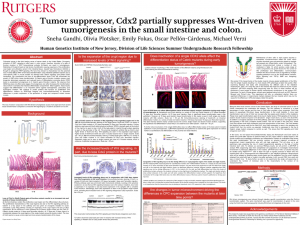Gandhi, Sneha: Tumor Suppressor, Cdx2 Partially Suppresses Wnt-Driven Tumorigenesis in the Small Intestine and Colon
Title: Tumor Suppressor, Cdx2 Partially Suppresses Wnt-Driven Tumorigenesis in the Small Intestine and Colon
Name: Sneha Gandhi
Major: Genetics
School affiliation: School of Arts and Sciences
Programs: Division of Life Sciences Summer Undergraduate Research Fellowship (DLS-SURF)
Other contributors: Sneha Gandhi, Ruchi Aluwalia, Rohit Kumar, Olivia Plotsker, Emily Fokas, Oscar Pellón-Cárdenas, Michael Verzi
Abstract: Colorectal cancer is the third leading cause of cancer death in the United States. Oncogenic activation of WNT- signaling is often seen in colon cancer, therefore, induction of a gain of function mutation in WNT transcriptional activator β-Catenin can result in tumorigenesis. Stabilizing of B-catenin leads to high levels of proliferation causing expansion of the proliferative crypt region and ultimately cancer in the intestinal tissue. Caudal Type Homeobox 2 (CDX2) is thought to antagonize WNT signaling. We have thus chosen to characterize how the potential loss of CDX2 affects WNT driven tissue transformation using intestinal epithelium-specific and a colon-specific CRE in mouse models for aberrant beta catenin signaling and partial CDX2 inactivation. We hypothesize that loss of pro-differentiation factor Cdx2 will exacerbate the growth of WNT-driven tissue transformation. β-Catenin gain-of-function mutation causes crypt progenitor phenotypic expansion and reduced levels of differentiation promoting factor CDX2 leads to accelerated tumorigenesis in β- Catenin gain-of-function mutants. We observed that CDX2 loss does not affect early stages of tumorigenesis, but rather increases the transformation rate at which it overtakes the intestinal differentiated compartment. Taken together, these results suggest that differentiation is an important barrier against tumorigenesis, particularly post tumorigenic initiation. We continue to profile proteins that function as proliferation and differentiation markers by SDS-Page analysis and immunohistochemistry to showcase differences in protein expression in the epithelium of single and compound mutant mouse models.
